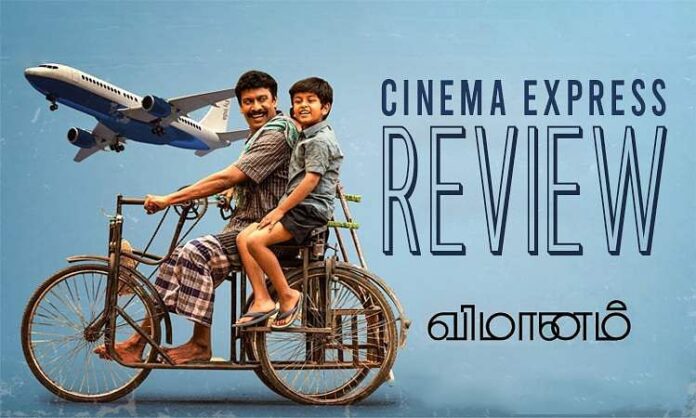Though the most recurring visual of Vimanam is the sight of planes chewing up the screen in all directions as they surge across the sky, the shot that is definitive of the film at large is ironically one that pans downwards as Veerayya (Samuthirakani) halts his disability-friendly cycle outside a temple and lays his feet on the ground. One foot is twisted, deformed and immobile. The other works just fine. He heads to a temple, passing through a horde of beggars chanting “Dharmam cheyandi ayya” and praying to god with his palms cupped open. A well-off woman at the temple puts a hundred rupee note before scooting off in her car. Veerayya, confused screams out for the woman before giving that note to a beggar. The beggar calls him a god, only to have Veerayya gently chide them to try working for a living. The director, not leaving any stones unturned while putting forth his point, makes sure all the beggars are able-bodied. If you have ever heard anybody — most likely people of an older demographic coupled with a conservative outlook, make comments to the tune of “People should only beg for a living when they are disabled.” or “Look at that person achieving professionally despite their disability.” — only to find yourself enraged at the statements’ patronising, ableist overtones, then Vimanam maybe not your cup of tea.
Director – Siva Prasad Yanala
Cast – Samuthirakani, Master Dhruvan, Rahul Ramakrishna, Dhanraj, Rahul Ramakrishna, Anasuya Bharadwaj
On the other hand, Vimanam might just be the kind of film for the viewer who believes otherwise. For a film that has marketed itself as a melodramatic feature, the father-son counterpart of Chiyaan Vikram’s Deiva Thirumagal/Naana, the socio-political messaging Vimanam continuously gives — with an arguably outdated and unidimensional perspective, makes the film a polarising, infuriating watch.
Veerayya’s disability is also emblematic of the larger, societal barriers he has to endure due to his poverty and caste (he cleans and manages a shulabh shauchalaya for a living, a job he mentions his father and grandfather also had), not entirely unlike the way Veerayya’s son Raju’s love for aeroplanes is representative of ambition, emancipation and upward social mobility. The film’s key conflict arises when Raju gets diagnosed with advanced leukaemia. The father must now find 10,000 rupees and ensure he rides in a plane one time before he dies. The second half of the film would have never existed if Veerayya simply got a loan. Instead, we get an assembly line of conflicts, ranging from Veerayya losing his job to him getting wrongfully arrested for stealing money to him being the victim of a bigger robbery. The class politics of a working-class man trying to buy a plane ticket are laughably bad. Sample this — There is a woman at an air ticket agency who tells Veerayya that her office is not a bus stop when he steps in and a man who says, “I have not set foot in a plane despite earning in crores how do *you* possess the temerity to have such a dream.” Is it the characters saying these lines or the director projecting his own take on class discord? The rest of the film is not entirely behind when it comes to substituting character design with preachiness and the incessant projection of a certain school of thought.
Vimanam is also riddled with glaring instances of cognitive dissonance. Veerayya hates being pitied, refusing to even take a disability pension, and yet the film continuously tries to arouse pity from the audience for his series of misfortunes. The subplot involving Rahul Ramakrishna and Anasuya Bharadwaj is equally confusing. We are expected to believe he loves her, only for him to ogle at the woman changing her clothes and lust for her throughout the film. Anasuya has a line in the film about her feeling uncomfortable being reduced to a mere object of desire, but how do you take her (or rather, what the director seems to project through her) when the camera angles are solely aimed at sexualising her with distasteful gazes. The film’s hypocrisy and indecisiveness also derail the viewer from its emotional core, always keeping you away from focusing on the father-son relationship, which, for what’s worth, did have some sincerity to it all. Speaking of which, what is the point of having a sad ending if it does not provide catharsis or closure? “Okay, but at what cost?” is probably the only thought the film leaves you with as the curtains close, after flashing a note on gods and fathers.
#Vimanam #Movie #ReviewA #pitiful #platitudinous #downer #film #Cinema #express

